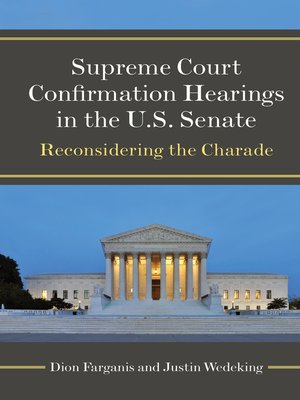Supreme Court Confirmation Hearings in the U.S. Senate
ebook ∣ Reconsidering the Charade
By Dion Farganis

Sign up to save your library
With an OverDrive account, you can save your favorite libraries for at-a-glance information about availability. Find out more about OverDrive accounts.
Find this title in Libby, the library reading app by OverDrive.



Search for a digital library with this title
Title found at these libraries:
| Library Name | Distance |
|---|---|
| Loading... |
How much do Supreme Court nominees reveal at their confirmation hearings, and how do their answers affect senators' votes?|Critics claim that Supreme Court nominees have become more evasive in recent decades and that Senate confirmation hearings lack real substance. Conducting a line-by-line analysis of the confirmation hearing of every nominee since 1955—an original dataset of nearly 11,000 questions and answers from testimony before the Senate Judiciary Committee—Dion Farganis and Justin Wedeking discover that nominees are far more forthcoming than generally assumed. Applying an original scoring system to assess each nominee's testimony based on the same criteria, they show that some of the earliest nominees were actually less willing to answer questions than their contemporary counterparts. Factors such as changes in the political culture of Congress and the 1981 introduction of televised coverage of the hearings have created the impression that nominee candor is in decline. Further, senators' votes are driven more by party and ideology than by a nominee's responsiveness to their questions. Moreover, changes in the confirmation process intersect with increasing levels of party polarization as well as constituents' more informed awareness and opinions of recent Supreme Court nominees.







